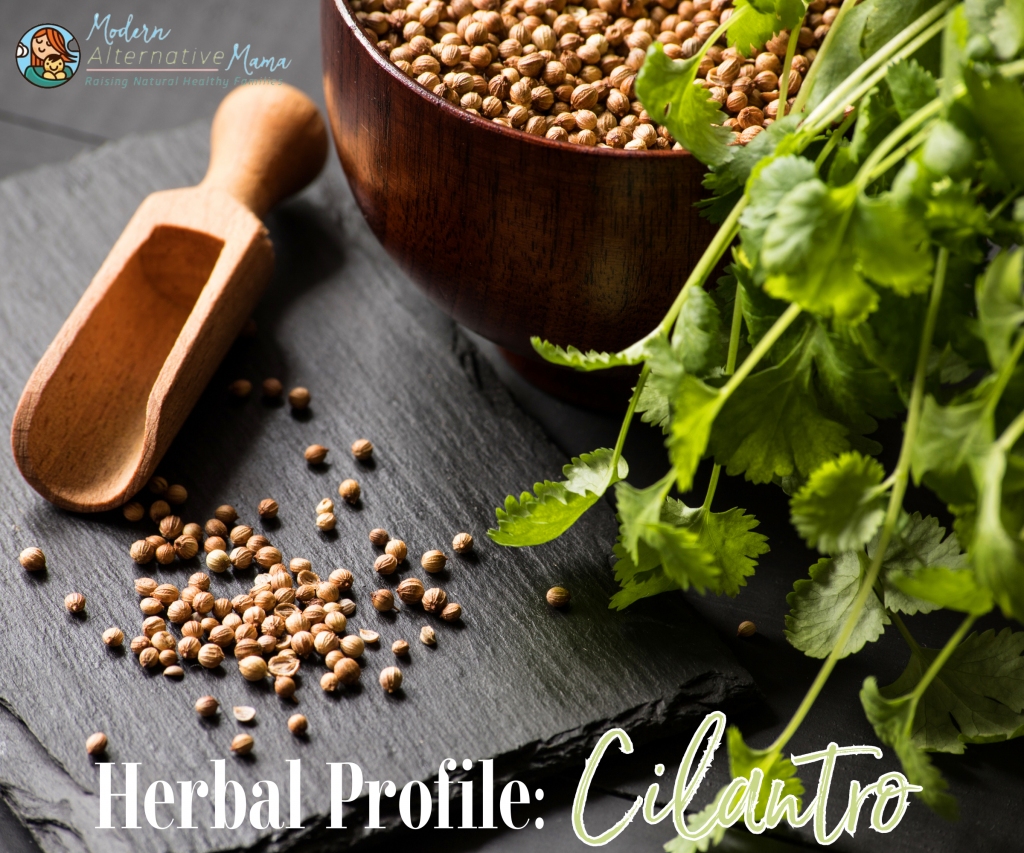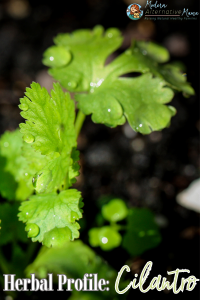What is Cilantro
Cilantro, sometimes referred to as Chinese parsley, coriander, or by its botanical name Coriandrum sativum, is a part of the Apiaceae (parsley) family. Cilantro is the plant’s leaf, while coriander is the plant’s seed, and both are used as spices and medicinal herbs worldwide (1). The cilantro plant can be identified by its clusters of white/pink flowers and wide, flat, fern-like leaves that grow along the flower’s stalk that grows up to 3 feet tall (2).
Health Benefits of Cilantro
Aside from being a delicious herb we add to food, cilantro and coriander seeds are also highly recognized for their many health benefits, such as:
Rich in Nutrients
Our body needs nutrients to flourish. Without vital vitamins and minerals, our bodies won’t function properly. Fresh cilantro is rich in protein, fiber, calcium, iron, magnesium, phosphorus, potassium, sodium, vitamins A, C, K, and folate (3). Dried cilantro is rich in protein, fiber, calcium, iron, magnesium, phosphorus, potassium, zinc, copper, manganese, selenium, vitamins A, B6, C, E, K, and folate (4).
Antioxidant Properties
Antioxidants can help fight damage from harmful free radicals. The buildup of free radicals has been linked to chronic diseases, such as cancer and heart disease (5). Studies have found cilantro functions as a natural antioxidant, although other herbs like parsley have performed better (6). The polyphenol fraction of cilantro is responsible for its antioxidant properties and antidiabetic and anti-inflammatory properties (7).
Antibacterial Properties
An antibacterial property is when a substance, or in this case, an herb, can destroy or suppress the growth and reproduction of bacteria (8). In vitro, coriander seeds could fight bacteria responsible for urinary tract infections (9). One study suggested coriander seed essential oil’s antibacterial properties could successfully fight foodborne illnesses and hospital-acquired infections (10). Another study discussed that coriander seed essential oil has antifungal properties that play a role in these benefits (11).
May Improve Mental Health
Worldwide, 970 million people struggle with mental health, resulting in approximately 8 million deaths annually, accounting for 14.3% of worldwide deaths (12). Cilantro may help improve mental health and mood disorders (13). In animal studies, coriander extract was nearly as effective as Diazepam at reducing anxiety symptoms (14). Do you have the gene where cilantro tastes like soap but still want to reap the benefits? Another study found cilantro could reduce cortisol levels, reducing stress and improving negative emotions simply by breathing in the VOCs the plant emits (15).
May Lower Blood Sugar Levels
As of 2020, 34.2 million (1 in 10) Americans have diabetes, and another 88 million (1 in 3) Americans have prediabetes (16). On the bright side, studies have evaluated coriander seed compounds and discovered they reduce blood sugar by promoting enzyme activity that removes sugar from the blood (17). In several animal studies, diabetic rats with obesity and high blood sugar had a decrease in blood sugar, similar to the medication glibenclamide, after just one dose of coriander seed extract (18,19).
May Promote Detoxification
Cilantro plays a crucial role in detoxification, especially from heavy metals. Several studies have demonstrated that cilantro leaves can produce a chelating effect in water spiked with heavy metals. Despite skeptisim, a study found cilantro can reduce lead’s negative effect on liver enzymes, testosterone levels, sperm density, and concentration of lead in the mice’s testis (20). Another study found cilantro soup was reported to enhance mercury excretion following dental amalgam removal (21).
May Support Heart Health
Unfortunately, heart disease is the world’s number 1 cause of death (22). Due to the incredibly complex determinants of heart disease and various possible contributions, it’s hard to pinpoint an exact way to prevent it. Still, you can at least take steps to lower your overall risk. For instance, “bad” LDL cholesterol can build up in your arteries and potentially cause damage (23). That’s where cilantro may come into play.
Cilantro extract acts as a diuretic, helping the body flush excess sodium and water, in turn lowering blood pressure levels (24). In animal studies, coriander seeds also significantly decreased LDL cholesterol while increasing HDL cholesterol in rats (25). No wonder populations who consume larger amounts of coriander have lower rates of heart disease (26).
May Support Brain Health
Brain health refers to cognitive health, motor functions, emotional functions, and tactile functions. Brain functions may decrease across several areas as we age due to neurological conditions like Alzheimer’s, Parkinson’s, or even amyloid plaques (27). Parkinson’s, Alzheimer’s, dementia, multiple sclerosis (MS), and other brain diseases are associated with inflammation (28,29,30).
Coriander’s anti-inflammatory and antioxidant properties may help protect against neurological conditions. In animal studies, cilantro extracts protected against nerve-cell damage from drug-induced seizures in rats (31). In another animal study, cilantro improved the memory of mice (32). Of course, human studies need to be conducted, but animal studies have shown promise.
May Support Healthy Digestion
The digestion process breaks down food into smaller components that can be absorbed into the bloodstream and turned into nutrition (33). When your foods aren’t digested properly, you may experience digestive troubles like heartburn. Thankfully coriander seeds essential oil can accelerate and support healthy digestion (34). In human studies, patients with irritable bowel syndrome (IBS) had less abdominal pain, bloating, and discomfort when taking 30 drops of a coriander herbal remedy for eight weeks compared to the placebo group (35).
Anticancer Properties
Statistics say that 158.3 of every 100,000 individuals will die from cancer, but what if they didn’t have to (36)? Thankfully, cilantro contains terpinene, quercetin, and tocopherols, which have antioxidant, anti-inflammatory, immune-boosting, and neuroprotective effects that influence its anticancer properties (37,38,39). In vitro, coriander seed extract decreased inflammation while slowing the growth of breast, colon, lung, and prostate cancer cells (40).
Safety Concerns
According to mainstream sources, state cilantro is “likely safe” when taken in food amounts, but they claim there isn’t enough reliable information to know if it is safe when used in larger amounts. They recommend sticking to food amounts during all stages of life (41). Obviously, there is plenty of sourced evidence throughout this post showcasing the safety profile of cilantro in medicine amounts.
Contrarily, Mountain Rose Herbs, a trusted source for herbal education, states there are no known precautions for cilantro. Of course, as per usual, they recommend consulting with a qualified healthcare practitioner before using herbal products, particularly if you are pregnant, nursing, or on any medications (42).
As for coriander seed and cilantro essential oils, trusted aromatherapist Wendy Robbins indicates no known hazards aside from her normal precaution to never use any essential oils internally or undiluted (43).
How to Use Cilantro
You can find cilantro in dried bulk, pills, powders, teas, extracts, essential oils, or tinctures. Tinctures always contain the most concentrated amount of herbs. Teas and soups are also options, especially when following Ayurvedic medicine recipes. If you’re a cooking person, some great starter recipes featuring the use of cilantro are:
Follow the recommendations of any supplement; some of my recommendations include:
- Earthley’s Rustic Essential Oil Blend is designed to delightfully refresh your space. This rustic-like scent combines the freshness of bergamot with the intensity of frankincense, along with uplifting notes of coriander and patchouli. This blend of refreshing, relaxing oils makes your home smell clean and calm.
- Earthley’s Sea Salt Soap combines nourishing oils and gently-exfoliating sea salt to create an at-home spa experience. Our Margarita scent smells fresh and clean and is made with all-natural essential oils. Gently rub away dry, dead skin to reveal the glowing skin beneath it.
- Frontier Co-Ops Organic Cilantro Leaf is the leaf of the Coriander plant, an annual herb in the Apiaceae family. It is native to southern Europe and popular in Mexican, Thai, and Vietnamese cooking. It has a distinct parsley-sage flavor with a citrus-like burst, which makes it a great accent to salsas, sauces, and even soups. You can also use it to enhance the fragrance of marinades, vinaigrettes, and rubs.
- Plant Therapy’s Coriander Seed Essential Oil is more than just its fruity, peppery fragrance. This exotic essential oil holds a variety of benefits. For many years, Coriander Seed Essential Oil has been known to help stimulate the appetite and relieve the occasional upset stomach. Experiencing aches and pains in your muscles? This impressive essential oil can help alleviate those issues.
Disclaimer: This post is not intended as medical advice. These statements have not been evaluated by the FDA, and nothing in this post is intended to diagnose, treat, or cure anything. If you have questions, please do your own research or seek advice from a health professional.







